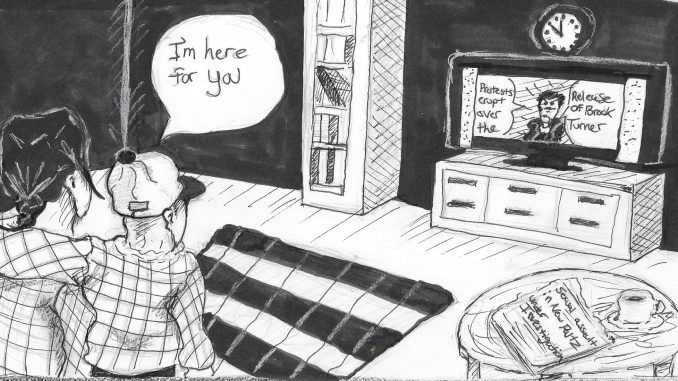
For our first editorial, we typically have a choice regarding the topic which we will write about. Unfortunately, this week we did not.
In the same week that convicted Stanford University rapist Brock Turner was released from jail, after serving just half of his six-month sentence for sexually assaulting an unconscious 22-year-old woman, a sexual assault occurred right off our college campus.
Protest over Turner’s light sentence for a heinous rape came in scores after his sentencing, and even more so now that he has been released three months early. This case, like many before it, shows that punishment for sexual assault on or near college campuses can be conditional based on race, gender, class privilege and association with a prided institution.
Turner’s case is a universal one. What’s even more terrifying is we all know a Brock Turner. We all know a rape case that has disturbed us to the core and unsettled our faith in one another.
But for many others, a legal case may not ever arise. Nationally, 63 percent of sexual assaults are not reported to the police, according to the National Sexual Violence Resource Center. The trial of Brock Turner provides only an inkling of reasoning into why this staggering statistic exists; the more the public sees rapists getting off the hook because they can throw a ball well or have money, the less victims may feel confident that their bravery in coming forward will be taken seriously.
When the assault took place in our community, students were alerted immediately by our University Police Department, for which we commend them. Their transparency steadied a community in crisis and kept students updated on the situation as it unfolded. Though the incidents did not occur on campus, the town is an extension of our campus where many students reside.
We at The New Paltz Oracle have had enough of the rape epidemic facing colleges across this country.
As journalists and fellow students, we wish we would not have to cover crimes like these in our own community. For the fourth-years on staff, writing about local sexual assaults and attempted rapes has become an annual occurrence, with each time being just as shocking and frightening as the one before it. But we will never stop bringing light to these cases, regardless of how frequently they may happen.
We believe there should be proactive measures taken across the country not just to address sexual assault, but to outright prevent it. The “It’s On Us,” campaign began as a White House initiative in 2014 to help put an end to sexual assault and has been upheld by various communities at SUNY New Paltz. Additionally, students should learn about consent when they are first taught sexual education in school. Mandatory sentencing for convicted rapists is also necessary to legitimize the severity of the crime and facilitate justice.
Brock Turner’s light sentence represents a fatal flaw in our judicial system, where bias favors white males of considerable class privilege. It is important to remember the crimes with which Turner was charged with: sexual penetration of an unconscious person, sexual penetration of an intoxicated person and assault with the intent to commit rape of an unconscious person.
According to a 2015 study from the American Association of University Women, (AAUW), 91 percent of colleges reported zero rapes on their campus in the 2014 calendar year. There may indeed be colleges with zero instances of rape, but it is highly suspicious for this many colleges to report in at zero percent. The Clery Act, which requires colleges to report information about crime to the Department of Education, was used as the basis for this study, suggesting that colleges may be covering up sexual assaults to prevent them from appearing on public record.
Though it is never the victim’s fault, the world in which we live requires precautionary measures. These include making sure your doors and windows are secured, always making sure someone knows where you are going and who you will be with, bring a friend along to parties to look out for one another.
A Rape Aggression Defense, (RAD), course is offered by the college in order to teach self-defense. Please call 845-257-2222 or email rad@newpaltz.edu for more information.
